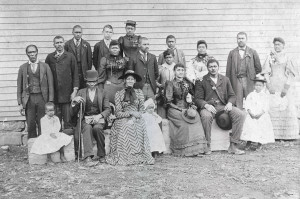Tennessee weighs an apology for slavery
Posted April 16th, 2014 by James DeWolf PerryCategory: Repair and reparations Tags: Apologies, Legislation, Racial discrimination, slavery, Tennessee
 Yesterday, we reported on our Twitter and Facebook accounts that the Tennessee House of Representatives had voted, 97-0, in favor of a resolution expressing “profound regret” for the state’s role in slavery and racial segregation—but only after stripping the resolution of its original language offering “profound apologies” for this history.
Yesterday, we reported on our Twitter and Facebook accounts that the Tennessee House of Representatives had voted, 97-0, in favor of a resolution expressing “profound regret” for the state’s role in slavery and racial segregation—but only after stripping the resolution of its original language offering “profound apologies” for this history.
This move by one chamber of the Tennessee General Assembly to express regret for slavery and discrimination follows a wave of such actions by states between 2007 and 2009, culminating in a failed attempt by the U.S. Congress to apologize for the nation’s role in slavery. And while this action comes several years later than the others, it fits the established pattern for such expressions of remorse.
Between 2007 and 2009, eight U.S. states voted to apologize, or otherwise express remorse, for their roles in perpetuating the institution of slavery. These states included six which are traditionally considered slave states (Alabama, Arkansas, Florida, Maryland, North Carolina, and Virginia), and two northern states, Connecticut and New Jersey, which, like other northeastern states, had long and painful histories of slavery.
Like many of these other statements on slavery, Tennessee’s resolution is direct in mentioning the historical atrocities it covers, referring to the “fundamental injustice, brutality, and inhumanity of slavery and the discrimination that was slavery’s legacy.” And, in fact, the primary function of state apologies for slavery may be to help educate the public about the full extent of slavery in their state’s history.
Just as state apologies in Connecticut and New Jersey helped open many people’s eyes to the magnitude of slavery in those states, it may be that more people in Tennessee, often considered a “border state,” will come to understand the depth of slavery in the Volunteer State. When the Civil War broke out, fully 1 in 4 Tennesseans were enslaved. Those enslaved in Tennessee worked large cotton plantations, but they also practiced skilled trades, contributed directly to industrialization, and even built much of the Tennessee State Capitol.
Yet the resolution, as adopted, dances around the issue of our connection today to this history, expressing “regret” rather than seeking to “apologize” for this history.
Why avoid directly apologizing for slavery and racism? One reason is that legislators, like many Americans, are reluctant to speak as if those of us alive today are responsible for historical wrongs committed in prior centuries. On the one hand, this attitude displays both logic and common sense. As opponents of slavery apologies often note, no one alive today participated in U.S. slavery. (The racial segregation and discrimination of the Jim Crow era is another matter, of course.) Yet this approach also flies in the face of the common tradition of speaking as if “we” are responsible for historical actions of which we are more proud, such as the American Revolution or Emancipation. State legislatures, public speakers, and even our schools and museums rarely hesitate to identify those of us alive today with uplifting actions taken in this country long ago. There is no reason why an institution such as a state legislature, which existed during slavery and Jim Crow and which took many actions to support both of these vile institutions, should speak as if it existed long ago for some purposes, but not for this.
There is another compelling reason why many states have chosen not to apologize directly for slavery and racial discrimination, but instead to speak less candidly about “regret” or “contrition.” The issue here is that many legislators, and their constituents, are worried that an official apology could lead to reparations for slavery, either in the legislature or in the courts. This has often been a stated reason for avoiding language expressly apologizing for slavery, and is often combined with language explicitly declaring that the resolution cannot be used as the basis for a legal claim for reparations.
In fact, the apology for slavery attempted by the U.S. Congress in 2009 failed precisely because the House and Senate could not agree on how best to ensure that an official U.S. apology for slavery did not become the basis for reparations lawsuits. This failure is a reminder that Tennessee has yet to adopt its statement of “profound regret” for slavery, which may still fail to pass in the state senate.



Leave a Reply